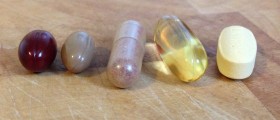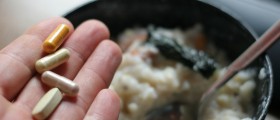
People may opt for taking fibersupplements for many possible reasons, most of which are related toboosting their health and overcoming some digestive problems or someother forms of health complications.
However, when choosing fibersupplements, numerous individuals may fear that these can bedangerous for their health. In order to dispel these doubts and findthe answer to these questions, the following lines are dedicated tothe safety and all other characteristics of fiber supplements.
What is Fiber Supplement?
Fiber supplement is a form of asubgroup of dietary fiber, consisting of isolated and non-digestiblecarbohydrates which are known to be beneficial for the physiology ofhuman beings. These supplements can be found in many forms, some ofwhich are powder, pills, tablets and capsules.
People take these supplements in orderto improve their dietary intake or lower the levels of cholesterolfound in their blood. Also, the take fiber supplements so as to getrid of the symptoms of the irritable bowel syndrome, reduce the riskof developing colon cancer and for the sake of ensuring their ownhealth in general.
Yet, one has to be very careful whiletaking fiber supplements. Namely, taking too much of these can becounter-productive, leading to various health problems, includingfluid imbalance, dehydration, mineral deficiency, negative nutrientand drug interactions etc.
As far as the practical effectivenessof fiber supplements in reducing cholesterol in the blood of thepatients, researches have shown that, in about 110 subjects, thefiber supplements had no changes in this state of affairs. However, ina different study, involving extruded carob pulp preparation added tothe daily diet of 58 subjects, an improvement in the healthy levelsof cholesterol was noted, bearing witness of the potential of thisform of supplementation.
However, more researches are necessaryfor changing the, so far, neutral status quo.
As far as the effects on thegastrointestinal health are concerned, a study in which about 1429men and women were given high-fiber cereal over the course of sixmonths, showed that this had no beneficial effect on the health ofthe colorectal area.
Some other studies have only showedimprovement in terms of relieving constipation, rather thanaddressing the source of the gastrointestinal problems. However, somefiber supplements, like the hydrolysed guar gum, have shown usefulfor alleviating the symptoms related to the irritable bowel syndrome.The same form of supplementation can also be used for reducingsymptoms of hunger, contributing to the weight-loss attempts thatpeople may undergo.
Still, all the positive effects offiber supplementation can only be reaped through adequate dosage andusage of them.
How Safe are Fiber Supplements?
According to the American DieteticAssociation, an average adult should not consume more than 38 gramsof dietary fiber on a daily basis. Taking into consideration that anaverage American citizen commonly does not cross the border of 15grams per day, most people are considered safe. Yet, it is alwaysrecommended to opt for natural fiber sources, adding plants, legumes,vegetables and grains into your diet, than to choose syntheticsupplements over these.
The supplements lack vitamins thatnatural sources of fiber have. Thus, if you take supplements afterexercising enough and eating foods rich in fiber, you might not needthe supplements after all. Basically, you should concentrate ontaking about 25 grams of fiber daily if you are younger than 50 andtaking 21 grams if you have crossed this age limit.
Translated into meals and nutritiveadvice, this accounts for a bowl of bran cereal for breakfast and abean soup for lunch on a daily basis. Of course, various othercombinations are advised to be introduced.
All these types of food, being rich infibers, are more pleasant and enjoyable for consumption, whencompared to pills.
However, if you have set your mind onthe latter, rest assured that, when taken within the recommendeddosage limits, these are safe too, just make sure you take them withplenty of water so as not to trigger constipation or some otherside-effects.
Also, if you are taking some othermedications along with the fiber supplements, consult with yourdoctor about the effects of such combinations and the potentialunwanted interactions you might not desire to experience. Do thisbefore taking the initial dosage of the supplement.
Finally, as for the brands of fibersupplements, these all look alike and, despite the names and otherfeatures, once they reach your stomach, these are almost completelyidentical. Moreover, if the supplements you are taking are of goodquality, like most of them are, they should have the exact effect asthe natural fiber sources have.
Thus, it is safe to use fibersupplements, even though, for the sake of enjoying the whole processmore, you are advised to turn to natural sources of fiber instead.

















Your thoughts on this
Loading...